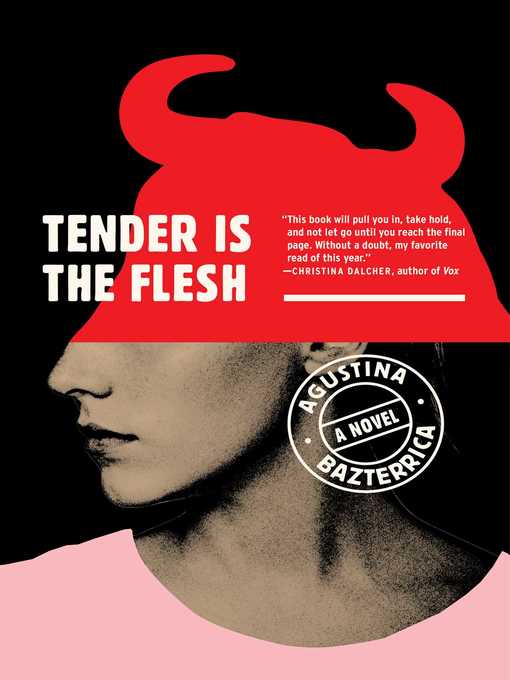
Tender Is the Flesh
کتاب های مرتبط
- اطلاعات
- نقد و بررسی
- دیدگاه کاربران
نقد و بررسی

May 11, 2020
Argentine writer Bazterrica’s uneven English-language debut disturbs with a vision of human cruelty and moral flexibility. Bazterrica efficiently establishes the premise: an animal-borne virus has led to the mass slaughter of all livestock, forcing the hungry populace to look for protein elsewhere (“At a chilling speed the world was put back together and cannibalism was legitimized”). Marcos Tejo works for a processing plant that slaughters genetically modified humans, or “head,” for consumption. Marcos is a dour character, emotionally hollow after the death of his son and working in a profession he despises to support his ailing father. After one of his clients gives him as a gift a “First Generation Pure” female—captive-bred, non-GMO human livestock—he begins to lust for her, though it’s a capital crime to “enjoy” females meant for breeding. Bazterrica is best when clinically describing the mechanisms of the harvesting process, from breeding to killing to butchering. These entrancing scenes normalize the brutality with euphemisms, demonstrating the Orwellian potential of language to “cover up the world.” The prose, though, can be overwrought at times—notably during a sex scene taking place on a bloody butchering table—but Bazterrica’s purposely unappetizing conceit makes for a powerful allegory on the human consumption of animals. Still, the execution will leave a bad taste in the reader’s mouth.

June 1, 2020
A processing plant manager struggles with the grim realities of a society where cannibalism is the new normal. Marcos Tejo is the boss's son. Once, that meant taking over his father's meat plant when the older man began to suffer from dementia and require nursing home care. But ever since the Transition, when animals became infected with a virus fatal to humans and had to be destroyed, society has been clamoring for a new source of meat, laboring under the belief, reinforced by media and government messaging, that plant proteins would result in malnutrition and ill effects. Now, as is true across the country, Marcos' slaughterhouse deals in "special meat"--human beings. Though Marcos understands the moral horror of his job supervising the workers who stun, kill, flay, and butcher other humans, he doesn't feel much since the crib death of his infant son. "One can get used to almost anything," he muses, "except for the death of a child." One day, the head of a breeding center sends Marcos a gift: an adult female FGP, a "First Generation Pure," born and bred in captivity. As Marcos lives with his product, he gradually begins to awaken to the trauma of his past and the nightmare of his present. This is Bazterrica's first novel to appear in America, though she is widely published in her native Argentina, and it could have been inelegant, using shock value to get across ideas about the inherent brutality of factory farming and the cruelty of governments and societies willing to sacrifice their citizenry for power and money. It is a testament to Bazterrica's skill that such a bleak book can also be a page-turner. An unrelentingly dark and disquieting look at the way societies conform to committing atrocities.
COPYRIGHT(2020) Kirkus Reviews, ALL RIGHTS RESERVED.

Starred review from June 1, 2020
This translated prizewinner by Argentinian novelist Bazterrica exquisitely dishes up an intricate tale of a systematized dystopian society. After a virus has made consuming all animals fatal for humans, humans are bred to be a protein source. Most of the story revolves around Marcos Tejo, who oversees all the aspects of the food supply chain, visiting the various vendors who do business with the meat processing facility he manages. Readers are given a horrifying blow-by-blow account of how humans are turned into products used in a tannery, butcher shop, game reserve, breeding center, and research laboratory. The unsavory depiction is not for the faint of heart, as Bazterrica's unflinching dissection of every detail is explicit and stomach-churning. Despite these gruesome occupational hazards, Marcos is an efficient and valuable employee, but his personal life is in shambles. His wife left him and he despises his sister, who shows little concern for the health of their homebound father. His melancholy shifts, however, when he is given a fine specimen from the breeding center who becomes a beacon of renewed purpose for Marcos, but to what end? This is a sagacious and calculated exploration of the limits of moral ambiguity; it sears and devastates.(Reprinted with permission of Booklist, copyright 2020, American Library Association.)

























دیدگاه کاربران